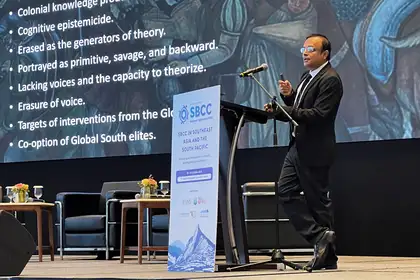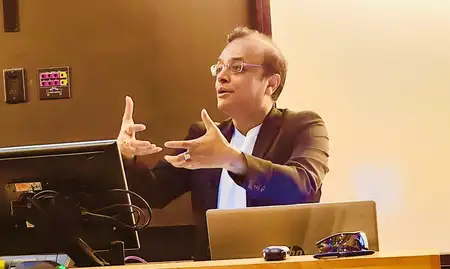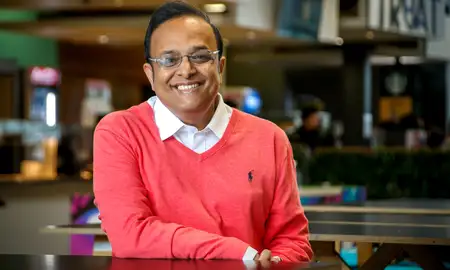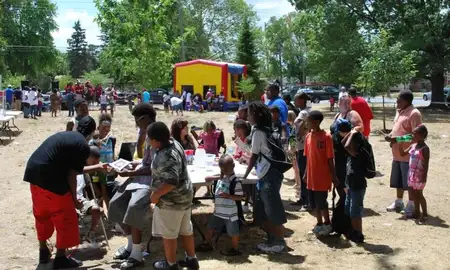
Professor Dutta delivering the keynote lecture.
Dean’s Chair Professor of Communication and Director of the Center for Culture-centered Approach to Research and Evaluation (CARE) Professor Mohan Dutta delivered the opening keynote at the first-ever Social and Behavioural Change Communication (SBCC) Regional Symposium last week.
The Symposium was jointly organised by UNICEF, Universiti Malaysia Sabah, Universiti Putra Malaysia and Universiti Kebangsaan Malaysia. The conference was inaugurated by Universiti Malaysia Sabah Vice-Chancellor Professor Datuk Dr Kasim Hj Md Mansor, UNICEF Representative to Malaysia and Special Representative to Brunei Darussalam Mr Robert Gass and Assistant Minister to the Chief Minister of Sabah Datuk Abidin Madingkir, representing Yang Amat Berhormat, Datuk Seri Panglima Haji Hajiji Bin Haji Noor, Chief Minister of Sabah.
The Symposium was centred around the theme ‘SBCC in Southeast Asia and South Pacific: Unlocking its Potential for Community Development and Resilience’. It explored the significance of communication in driving positive social and individual behaviour change in the context of the Global South. Drawing in attendees from more than seven countries in Southeast Asia and the South Pacific, the Symposium sought to create a platform for discussions on insights, best practices and innovative approaches to communication for social and behaviour change rooted in the region.
Professor Dutta says the various dialogues offered theoretical and practical examples of the transformative role of communication in fostering social change.
Bringing together community-facing organisations, academia, private sector and government, the Symposium sought to open up possibilities for bridging conversations and collaborations, highlighting strength-based strategies and laying out a conceptual framework for theorising and implementing social and behavioral change communication in the region. It sought to foreground the potential of communication in driving community development and effecting positive change in the region.
Professor Dutta’s lecture, titled Behaviour Change Communication in the Global South: A Culture-centered Approach, emphasised the intersections of local and Indigenous knowledge systems in decolonising social change communication. The lecture outlined the economic, political, social and cultural problems that have resulted from colonial structures and that continue to be perpetuated in dominant approaches to social change communication.
“These dominant approaches serve the interests of entrenched power configurations, are implemented in top-down forms and systematically erase the voices of communities at the margins of the margins,” Professor Dutta says.
In this backdrop, the conceptual framework of the culture-centered approach locates social change communication in community agency, conceptualising the roles of communities as the drivers of social change processes, he adds.
“The recognition of the knowledge-generating power of communities as drivers of change challenges the ongoing processes of colonisation and exploitation that work through the erasure, co-option and theft of community knowledge.”
Drawing upon two decades of ethnographic fieldwork carried out by CARE in the areas of Indigenous rights, migrant rights, transgender rights, anti-racism and working-class politics, the keynote addressed the role of community knowledge in building and sustaining transformative social change. Specifically, the lecture outlined the key tenets of the culture-centered approach in decolonisation struggles and in building registers of Southern theory, emergent from community participation and ownership.
Professor Dutta noted the important role of communicative sovereignty; the capacities of communities to own the infrastructures of storytelling. Through these, communities voice locally held knowledge, foreground the role of context in shaping knowledge and work with local knowledge in driving social change solutions. He offered examples that document the power of communities as storytellers in driving positive transformations at local, regional, national and global levels, noting that these local capacities lie at the core of driving transformations toward the United Nations’ Sustainable Development Goals (SDGs).
Professor Dutta wrapped up the talk by offering insights into the organising work of driving social change through the co-creation of community voice infrastructures.
“These voice infrastructures invert dominant formations of power, mobilising communities in struggles toward achieving the SDGs, addressing the intertwined challenges of extreme inequality, climate colonialism, food insecurity, poverty and digital colonialism,” Professor Dutta says.
Related news
Professor Mohan Dutta delivers Gravlee Lecture at Colorado State University
The Gravlee Lecture series brings eminent communication scholars to the Colorado State University campus for presentations and interaction with students and faculty.

Opinion: This is how we fight back: The academe’s resistance to the far-right’s culture war
By Professor Mohan Dutta

Opinion: The far-right, misinformation, and academic freedom
By Professor Mohan Dutta
